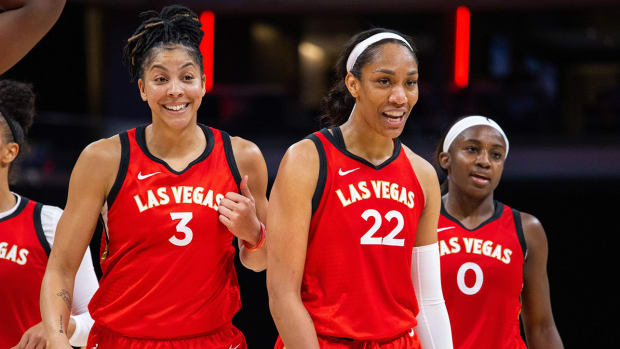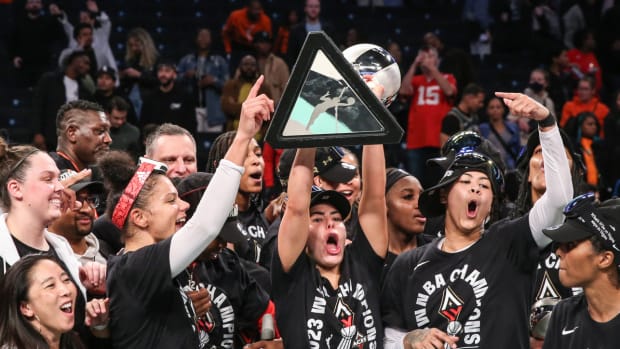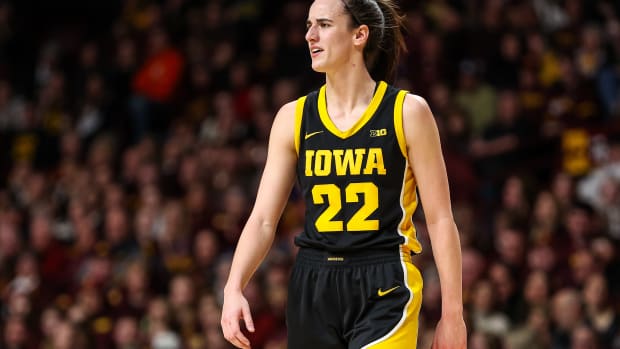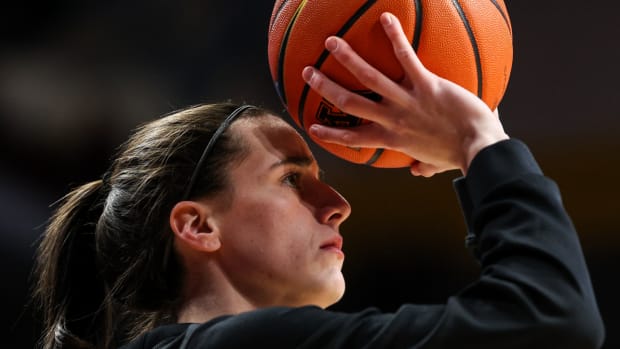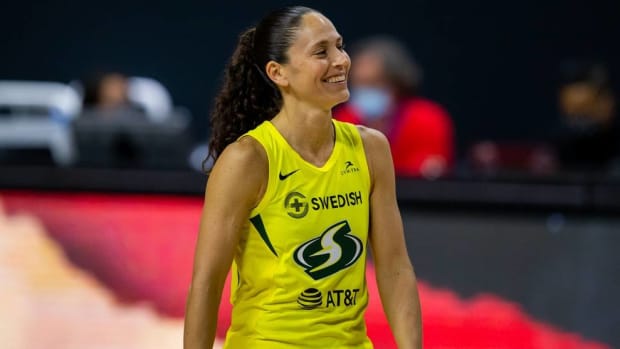Ahead of Her Likely Final Season, Sue Bird Reflects on How the WNBA Has Evolved
Sue Bird aims to please. That can mean hitting a teammate in a preferred spot with a pass, crisply delivered. That can mean satisfying as many colleagues as possible when playing the equivalent of point guard for the WNBA Players Association. That can mean accommodating all manner of requests for selfies, for autographs (yes, for interviews), as well as a Netflix entreaty to feature her in a forthcoming documentary. That can mean serving dutifully in her role as a daughter, sister, aunt and fiancé.
In Bird’s most recent WNBA appearance last fall, she was asked to take part in a postgame jersey swap with Diana Taurasi, a close friend since the 1990s at UConn. Bird’s team, the Storm, had just lost to Taurasi’s Mercury in the playoffs, thwarting Seattle's WNBA title defense. The last place Bird wanted to be immediately after a defeat? Standing center-court, wearing a forced smile, enduring some stage-crafted ceremony. But Sue Bird aims to please, and saying “no” would have felt worse.
As Bird was gamely congratulating Taurasi, a cheer began to swell inside the arena. Thousands of Storm fans, aware at some level that Bird, then 40, was contemplating a mike-drop retirement, offered vocal resistance. Spontaneously, they began chanting, “One more year. One More Year. ONE MORE YEAR.”
Bird being Bird, she listened. And accommodated. And so it is that—playing point guard for the only WNBA team she’s known—she’s back for another WNBA season. Likely her last, she says. How much did the fans influence her decision? “Oh,” she says, “like, 1,000%.”
As a bonus she gets to play in a swanky, new venue. Climate Pledge Arena sits at the base of Queen Anne hill and adjacent to the Space Needle, site of the old Seattle Center and Key Arena where the Sonics (R.I.P.) played and Bird began her WNBA career. Old address, modern trappings.
In a more macro sense, Bird gets to stick around the party just as it’s getting good. The WNBA is 25 years old—they grow up fast, these sports leagues—and it is having a moment. Television ratings are surging (at a time when television ratings don’t often surge.) Thanks to a CBA Bird helped craft, players are getting paid more than ever, the majority earning six figures. While harder to measure, the league has a cultural cache like never before.
In advance of the season, Bird spent time with 60 Minutes for a segment you can watch here. Herewith, some outtakes, edited lightly for brevity and clarity.
Jon Wertheim: You were drafted in 2002. What’s the biggest difference?
Sue Bird: Where to begin? I like to talk about on the court first. I think it’s been so fun to watch the evolution of the league. The way I like to frame it: In my opinion, it’s the most competitive professional league just in terms of making a roster. Twelve spots. There’s 12 teams, 144 [players]. It's literally survival of the fittest. And so what we've seen—you know, when I entered the league it was 2002. The league’s only four or five years old. And with each year, some people retired. New draft classes came in. Right?
And so it was always hard. But I think we’re at this point now where people like myself, people like Diane Taurasi, we’ve had these long careers. So there’s not a lot of retirement every year. But the draft classes still come. And so it's just gotten that much harder in the last five to 10 years. And so the product on the floor is just that much more competitive because it’s so hard to make a roster.
I think everything’s evolved. Coaching’s evolved. Even refereeing has evolved. Like, the whole game has evolved. So we’re just seeing this amazing product. And then you can shift to the off-the-court, which is totally different.
JW: What do you mean?
SB: We’re just being authentic. There’s something there that wasn’t there before. I think we were trying to figure out how to sell the league rather than just kind of being ourselves and let that be what sold us.
JW: Sell it to whom?
SB: Who knows what demo they were going for. There was definitely a target on kind of, like, the vibe around “sex sells.” You know? And in women’s sports, this is a real thing. … Sometimes it has to do with looks instead of skill. This is a real thing. What we’ve found is as time has gone, the more authentic we are, the more real we are—I think that people were afraid we were gonna lose fans. But the reality is, we were gonna lose those ones regardless. And we’ve only just gained.
JW: You were inspired by seeing Jen Azzi, who you say looked like you. Not a dissimilar game …
SB: I get Jen Azzi’d every now and then. And I’ve talked to her. I think she gets Sue Bird’d every now and then.
JW: You’re O.K. with that?
SB: Oh yeah. Absolutely. Love Jen.
JW: You’re a teenage girl and you’re seeing someone, ‘She looks like me, she plays the same position.’ What does that do to you?
SB: Oh, I think it’s life-changing. And it doesn’t even have to be somebody that looks exactly like you. But it’s so powerful. … I love sports. I was now starting to choose basketball as my path. And I was in this period of time where I just needed something to dream for. That’s what was missing, you know? I don’t want to put too much emphasis on this and to say, Had I not seen Jen Azzi, who knows what would’ve happened? But at the same time, had I not seen this path, this person who took this path, this person I could emulate, right? I mean, chances are I would’ve maybe found my way regardless. But that gave me something to cling to. I mean, clearly I’m sitting here, 41, I’m still talking about it. It’s a vivid memory for me.
JW: I’m hearing Billie Jean King: “You gotta see it to be it.”
SB: Yeah, it’s very true. … At that point there weren’t women on TV. You could catch the Final Four. That’s about it. You know, it was starting to change but not much. And all you could see was men’s basketball players. And, you know, it’s interesting you ask me who I emulate my game after. I didn’t have anybody.
JW: No WNBA.
SB: No. A handful of women’s [college] games if you knew where to look. Mike Bibby was my favorite player. That wasn’t until I was 16 years old. It’s amazing to know that there’s all these little kids —and not just girls, by the way, boys as well—that get to see these WNBA players. It gives them something to strive for. And I was lucky. Jen Azzi was the thing I got to strive for.
JW: Coach [Geno] Auriemma said, “Two words you’ll never hear Sue Bird say: ‘You’re right.’”
SB: No, I think it’s more, “I’m wrong.” [Laughing] Yeah, I tend to think I’m right. It’s a gift. It’s not always a good one.
JW: But it sounds like you’re not afraid to mix it up.
SB: Oh, no. Not at all. This is like therapy. This is a trait that I’m working on. I understand that when you are having a conversation and you come from a place of always being right, it’s not really pleasant to always talk to those people. … So I’m very aware of that in my social life. … When it comes to basketball, though, I’m not doing it for bad reasons, you know? I feel like when I’m out there, I’m playing in a game, or if I’m watching something, I genuinely think I’m right if I’m saying something. If I think I’m wrong, I just won’t say anything.
JW: You must’ve heard this a million times. This shabby [trope] “I don’t like women’s basketball ’cause they don’t dunk. And they play below the rim.” Where are we with that?
SB: I mean, it’s fascinating you ask me this now because what’s fresh in my mind is NBA All-Star, where everybody was complaining that the dunk contest was boring and the three-point contest should go last. So hopefully they keep that energy. Which I’m sure they won’t. To me, it’s such a tired argument. I don’t even pay attention anymore when people say that.
JW: Don’t even care?
SB: I don’t care at all. I think if you caught me a couple years ago, I would’ve dove into this whole thing about how in my experience, from my perspective, basketball is a very popular sport. O.K.? So you don’t have a lot of people going out and playing pick-up tennis. Or pick-up soccer. Or pick-up anything. … And I think what that has created is a lot of people, mostly guys, who think they can play. And so all they’re doing is sizing us up and putting us down, because we’re not doing what the NBA guys do. So we get compared a lot. So it’s like two things are happening. One, the average guy is sizing us up, talkin’ about, “I can beat you.” They can’t.
And then the other thing that’s happening is we’re just naturally getting compared to our male counterpart. It’s like if you take boxing, for example, right? You have the heavyweights. And the heavyweights compete against the heavyweights. And everybody respects when Mike Tyson is going out there and beating everybody.
And then you have the other weights, the lighter weights, right? So, a Floyd Mayweather. And he’s going out there and beating everybody. And everybody respects him. But nobody says, “Oh, well, Floyd, you suck ’cause if you stepped in the ring with Mike Tyson…”
I have so much respect for NBA players. I know, as a basketball player, what goes into it. And I know that I can’t dunk and I can’t do those things. But that’s just a physical thing. That’s just what it is, genetically, hormones and stuff. So I don’t feel the need to compare in those ways. I can look at men’s basketball and appreciate it. I can look at women’s basketball and appreciate it. And I just think a lot of people get caught up in the comparison. And that’s what happens. The reality? Why does that matter?
JW: Serena Williams is awesome. No one says, “But she can’t beat Nadal.”
SB: So to me, that’s another good example, the tennis one. Not a lot of people play tennis. A lot of people play basketball. It’s interesting dating a soccer player because they don't get as much [comparison].
JW: You know, one group of fans who don’t knock the WNBA? NBA players.
SB: I know.
JW: They wear your jerseys …
SB: [T]hey also see the actual basketball happening. And that’s what a lot of people that don’t play the game at a high level don’t see. They don’t see the skill, you know? They’re just seeing the dunking. They’re just seeing the athleticism. They’re not seeing the skill or, “Wow, I can’t believe the person read the pick-and-roll so well.” And that’s something where if you sat down with LeBron, Draymond, you name it, Kyrie—I mean, we’ve been on the Olympic teams together.
JW: They’re wearing your jerseys. They’re on social media praising you. Validation?
SB: Yeah. I think there is. I think because these guys when they put the touch of approval on something, it matters. I think there’s another part to it where you don’t want all of your validity to ride on one NBA player wearing your jersey [laughing]. You don’t want that either. But I think it’s great that they support our league the way they do. And the friendships that you see, they’re real. They’re genuine friendships. They can just watch us and respect it.
I think a lot of what Kobe Bryant was doing with his daughter was … It was like he saw his daughter, Gigi, was just a kid who loved basketball and was willing to train, willing to put in the hours, the hard work. And in reality, those paths are not different, whether you’re a boy or a girl. They’re not. If you love the game and you want to train and get better, it’s not that much different. And I think what he saw was the difference wasn’t that. The difference was the opportunity, the way the game is looked at, how people are talking about it.
And I think he was really gonna try to change the narrative surrounding all of that because I think he really saw that there were no differences. I remember when I was, like, 10, 11, 12—I mean, I was beating all the guys. I’d play one-on-one with all the boys and I’d beat all of ’em. So, like, what happened? Oh, puberty.
JW: Biology did its thing.
SB: Yeah.
JW: I mean—tell me if I’m wrong—I don’t think it was always like that. I don’t think five, 10 years ago NBA players were wearing jerseys and being so supportive.
SB: Yeah, I don’t know. That’s a good point. So here’s what’s interesting, and this is a vivid memory. So for the 2004 Olympics, we’re in Athens. It’s my first Olympics and I come to realize that all the Olympics are like this, where the men’s and the women’s teams are together. They’re hanging out, and basketball comes up a lot. It’s what all of us do for a living. And when you’re around LeBron, one of the first things he said was, like, “Oh, yes. You guys are second in the West. I saw you’re only one game behind L.A.” Like, he actually knew. And it’s not even to say that LeBron was sitting down, watching WNBA League Pass every game, you know? I’m not even saying that. But he had an awareness, and I think that says a lot.
JW: We asked Coach Auriemma, “Would Sue be a good coach?” He said, “A good coach, but coaching’s beneath her.” Is coaching beneath you?
SB: He would say that. He doesn’t want the competition…. Is coaching beneath me? No. I don’t think it’s beneath me. I know coaching is very difficult. And the thing that turns me off about coaching is that I feel like I’ve just lived this life. The travel, the kind of highs and lows from game to game, week to week, month to month. And I recognize that, as a coach, I would have much less control than I do now, as a player. And I know that would be a really hard adjustment. Plus all the other things I don’t know about being a coach.
JW: Like, in college, you gotta recruit?
SB: Well, that, too. I mean, that sounds like the pits. No offense. That sounds really, phew.
JW: You don’t want to sweet talk teenagers into coming to play for you?
SB: I mean, I remember being that teenager. And looking back now, I'm like, “Oh, my God, that assistant coach did not care what TV shows I was watching and she had to pretend to.” Like, that’s awful.
JW: You don’t want to call teenagers today and say, “Oh, my God …”?
SB: I know those TikTok dances. I got that goin’ for me.
JW: You watch Emily in Paris?
SB: Yeah, I don’t. I did watch Sex Lives of College Girls, though. So yeah, that’s part of what turns me off about coaching, just the life and I know it would be really hard. I’m kinda like, “Do I want to do that again?” The part that turns me on is it’s basketball, and it’s teaching, and it’s going on that journey and trying to figure it out. And I clearly love that part of it.
JW: We talked to the Denver Nuggets, where you did a stint in the front office. They give you very high performance reviews.
SB: Those are my guys. Yeah.
JW: Did you ever see yourself running an NBA team?
SB: I don’t know. An NBA team? I don't know. Maybe.
JW: You don’t have to recruit teenagers.
SB: You don't have to recruit but you’re traveling. You know what’s interesting about that Denver experience? It felt like it happened so fast. It was just this one season. And it wasn’t until I was removed from it and then talking to my WNBA GM where I realized just how much I learned. I do feel like that one stint gave me an idea of how I would be a GM, the things I would look for, identifying certain talent, putting together teams. But that’s also hard work. And I’m sorry to sound like I’m averse to hard work. It’s not that. It’s just, is that how I want to spend my time? Kind of living the life I just lived? Maybe. Maybe.
JW: All-time starting five, co-ed. Who are your five players?
SB: Oh, sheesh. Co-ed?
JW: Men and women.
SB: So this is gonna be a mixture of favorite players and just really good ones. So Mike Bibby, all-time favorite. We talked about this. I’ll have him at the one. I’m gonna go Diana Taurasi at the two. I’m gonna go Maya Moore at the three. I’ll go Lauren Jackson and Breanna Stewart. And there …
JW: Your co-ed’s all women. All right.
SB: No, Mike Bibby.
JW: Oh, right, you love Mike Bibby. Mike Bibby’s your one guy?
SB: My one guy.
JW: Jordan? LeBron? Kobe?
SB: Mmm. It’s my five. We’re positionless. We can do whatever we want.
JW: Magic, Jordan, LeBron can come off the bench?
SB [laughing]: Yeah, if they’re even on the roster.
More WNBA Coverage:
• Daily Cover: How Russia Pushed the WNBA to a Crossroads
• Behind the Scenes With No. 1 Pick Rhyne Howard Went at the Draft
• Shakira Austin Bet on Herself. And Now It’s Paying Off Big















